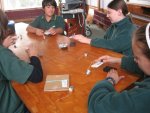Hi there,
I have been diping in and out of this forum for a while and have noticed that many members seem to be involved in education at some level.
I teach 11-18 year olds Design Technology and am constantly on the look out for interesting projects for my pupils to do, I have used the PICAXE 08M with 13 year olds and the 14M and 18X chips with GCSE students.
There are a lot of kits out there that I am interested in but they are too expensive, for example, KITRONIC have a good thermometer for about £4 each but I am looking at a budget of half that.
but I am looking at a budget of half that. 
Any suggestions?
We use PIC LOGICATOR (flowchart method) as our programming editor and can produce our own PCB's.
I have been diping in and out of this forum for a while and have noticed that many members seem to be involved in education at some level.
I teach 11-18 year olds Design Technology and am constantly on the look out for interesting projects for my pupils to do, I have used the PICAXE 08M with 13 year olds and the 14M and 18X chips with GCSE students.
There are a lot of kits out there that I am interested in but they are too expensive, for example, KITRONIC have a good thermometer for about £4 each
Any suggestions?
We use PIC LOGICATOR (flowchart method) as our programming editor and can produce our own PCB's.





